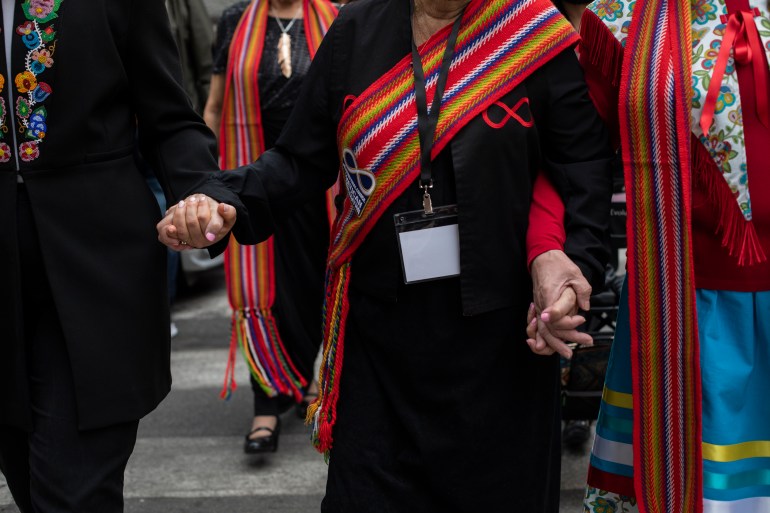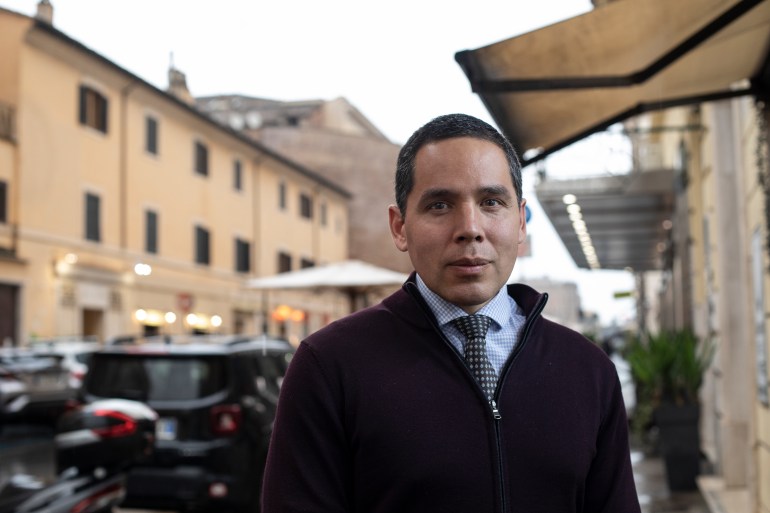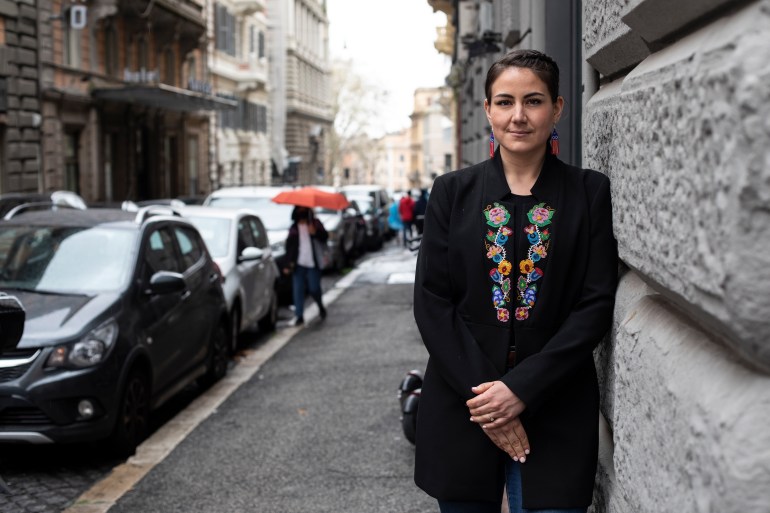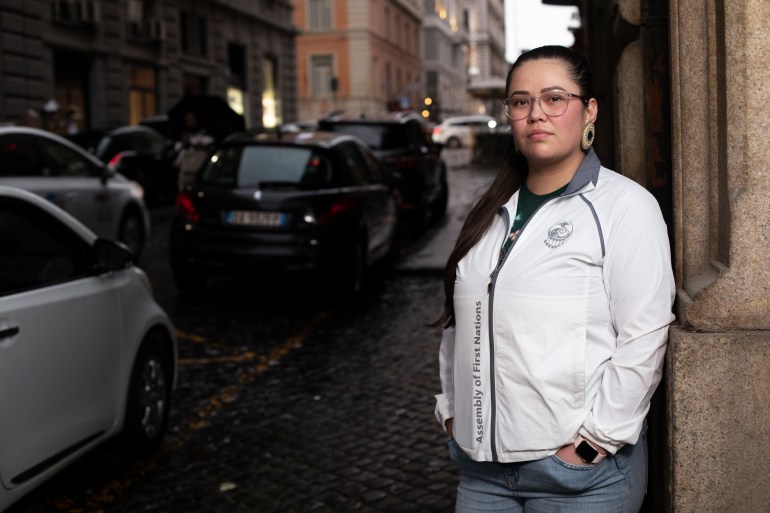CANADIAN RESIDENTIAL SCHOOL DELEGATES TALK TO POPE
‘I needed to be here’: Indigenous delegates speak their truths
Al Jazeera speaks to Indigenous delegates meeting with Pope Francis to demand an apology for residential schools.

Warning: The story below contains details of residential schools that may be upsetting. Canada’s Indian Residential School Survivors and Family Crisis Line is available 24 hours a day at 1-866-925-4419.
Rome, Italy – Representatives of the Metis, Inuit and First Nations peoples in Canada travelled to Rome this week at the invitation of Pope Francis to discuss the impacts of Canada’s residential schools.
KEEP READING
list of 3 itemsThe Indigenous elder hoping for an apology from the pope
Indigenous delegates hold first talks with Pope Francis in Rome
Canada: Indigenous leaders to meet pope in Rome at end of March
The federally funded institutions operated from the late 1800s until 1997 with the goal of forcibly assimilating Indigenous children into the mainstream European culture.
Over 150,000 Indigenous children from across the country attended the schools and experienced physical, sexual, emotional, verbal and spiritual abuse. Thousands died while in attendance
The Roman Catholic Church administered more than 60 percent of the schools and despite multiple pleas from survivors for an apology, the church has not yet given one.
During their meetings in the Italian capital, the Indigenous delegation – made up of community leaders, residential school survivors, and youth – told the pope about the horrors of the residential school system and asked for him to come to Canada to apologise on Indigenous lands.
Al Jazeera spoke to five delegates about the visit’s importance and what they hope to achieve.
Norman Yakeleya, Dene, First Nations delegate, survivor of Grollier Hall residential school in Inuvik, Northwest Territories

Yakeleya was taken from his parents and sent to the residential school at age five. He was kept there until his late teenage years and says he endured verbal, physical, spiritual and sexual abuse
“We paid the price as survivors, and my mother and all mothers paid the price for sending their kids to attend.
“At that time, we didn’t talk about it. We didn’t feel and we certainly didn’t trust anybody. Everything was kept in secrecy under the cloak of the Roman Catholic Church because those people [weren’t supposed to] do those things, we were told. They worked for God. So, we lived in our own jails with our own hurts and not knowing what to do and how to say things.
“When you’re hurt, especially by sexual abuse, as a young boy, you don’t talk about it. There’s a lot of shame. How can another man do that to you? And then try to live a good life as the Bible teaches us? How can you forgive that?
“Sometimes it doesn’t seem like there’s hope. But I get to live another day here.
“‘This too shall pass,’ it says in the Bible. The Bible also says ask and you shall receive, seek and you shall find, knock and it shall be opened to you. We have asked the pope [to hear us], now we’ve received this invitation, now we’re going to knock on his door, and it shall be opened to us.”
Natan Obed, president of Inuit Tapiriit Kanatami, intergenerational residential school survivor

“I’ve always had mixed feelings about all of the work that we’ve been doing on this.
“It is essential for reconciliation and for healing and for justice but it also is something that’s uncomfortable at times, because the relationship between, whether it be the Catholic Church or the Anglican Church or other faith-based organisations, and the Inuit has not been good over time.
“There are many who still aren’t willing to forgive or to enter into a partnership with the Catholic Church or other institutions, so we walk that line about who we bring into this conversation and how much time we spend on it. I’m happy that I have been able to bring forward the Inuit, but it’s something that’s quite stressful.
“I had a very positive feeling about the genuine nature of this engagement. Now, where we go from here is more clouded.
“We feel that the pope has an authority that goes far beyond what anyone else in the world has. So, we asked him to intervene and for Father Rivoire [a fugitive Oblate priest, now 93, who is accused of sexual assault against numerous Inuit children] to voluntarily go to Canada to face charges. If that does not happen, we’ve asked the pope to intervene with the French government to try to find a way for Father Rivoire to stand trial in France.
“The pope talked about how this is unacceptable. He also talked about how he never wants to see sexual abuse again at the hands of anyone related to the church. It was good to hear him so clearly talk about what he believes in and how categorically wrong it is what has happened to Inuit. I think the Inuit people who were in the room were very thankful to hear that from the pope and I’m sure that as we move forward in this, his personal attention to this particular part of the residential school experience and the cascading negative effects and that lack of justice is going to be integral in us getting justice.”
Lorelei Williams, Salish/Coast Salish from Skatin Nations/Sts’Ailes, intergenerational residential school survivor

Williams’s parents, now deceased, were survivors of the St Mary’s Indian Residential School in Mission, British Columbia.
“What’s happening here in Rome right now, I just can’t believe it’s actually happening. It’s something I needed to see with my own eyes. For the children, for the missing and murdered [Indigenous women and girls] and for my parents, I just felt like I needed to be here.
“I totally feel like the government killed her [my mother]. The government has killed all our people. I say that because any Indigenous survivor who has passed away is because of that trauma from the residential schools.
“I’m grateful to see what is coming out of it, coming out in the media. It opens people’s eyes more. But I have trust issues with the government, I have trust issues with the churches. I always have hope, but I won’t be shocked if nothing comes out of it [from the church].”
Cassidy Caron, president of Metis National Council

“I’m here to represent our people, their perspectives and the diversity of perspectives of the Metis Nation.
“It has been a whirlwind. I keep telling everybody that I feel as though we’ve been here for two weeks, but it’s only been, so far, three days. I think it’s a testament to how busy we are and how much work we’re getting done during the time that we are here.
“We’ve worked with our elders and our survivors who told us that the greatest gifts that we can bring to Pope Francis are our stories and our truth. And during the meeting with Pope Francis, that’s what we did.
“Our people have not received the recognition or the compensation that they deserve. And so, we were able to share that and talk about how we have a vision for moving forward with truth, reconciliation, healing, and justice.
“Regardless of the outcome of this trip, we now know we have marching orders from our community members regarding what’s needed. And we can start working towards that regardless of who joins us on our journey. It would be wonderful if the Catholic Church wants to join us on this journey. But for me, I want to be able to make a difference and create a brighter future for our community.”
Taylor Behn-Tsakoza, member of Fort Nelson First Nation, Assembly of First Nations youth representative

“To be in Rome for the first time has been exciting but being part of the delegation just really makes the experience more meaningful and purposeful and all those kinds of things for me.
“It’s hard to explain, but I could just feel it in my heart: When I walked, every step I took was like, you know, it was like someone was helping me. Then being in that room in front of the pope, he seemed to acknowledge and be responsive to what we were saying.
“This isn’t just some checkmark with reconciliation. This is just another step. And I think when we go home, that’s what’s going to matter most … when we go home, [that we] continue to hold the Catholic Church accountable.
“And there’s also a personal journey and healing towards reconciling that we have to deal with ourselves because all the healing that needs to be done to walk through this journey of justice and reconciliation.”
No comments:
Post a Comment